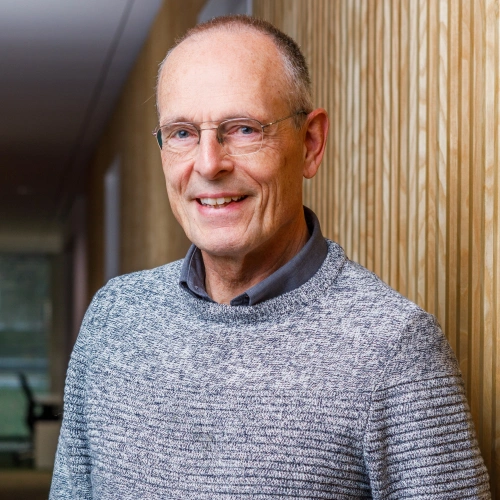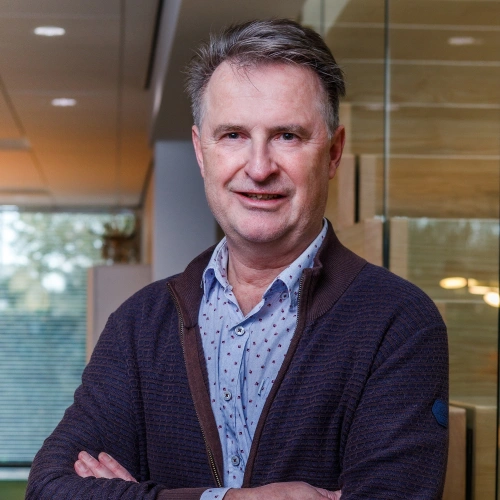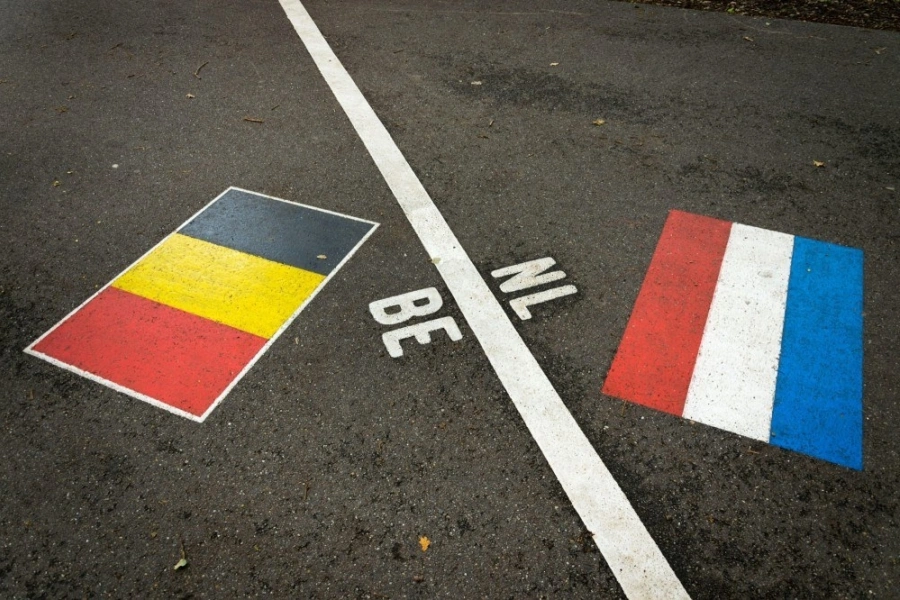Why do we do this? Because collaboration doesn’t have to end at the border. In fact, that’s often where new opportunities begin. “That’s often where acceleration starts,” says Paul Gosselink, Program Manager for New Energy Ecosystem Development at BOM. “I see every day how SMEs boost their innovation power and market position when they collaborate smartly. So dare to look beyond and take that step across the border.”
European subsidy projects
BOM is involved in several European Interreg projects that help in growing enterprises. Learn more about some subsidy projects and the project information.
Find out more?


How do we support? BOM assists in partner selection, subsidy applications for feasibility studies, and bridging practical obstacles. "We notice that many innovative SMEs are willing, but don't know where to start," says Gerard Blom, program manager for ecosystem development in circularity at BOM. "We ensure they dare to take that first step."
European Collaboration
BOM connects entrepreneurs with potential partners across borders in various ways. One example is the so-called Interreg programs. The goal of these programs is to stimulate European innovation collaboration and overcome border barriers.
Interreg is part of the European Regional Development Fund. BOM is involved in various Interreg programs. BOM connects entrepreneurs from Brabant with knowledge partners, facilities, and entrepreneurs across borders. We do this for a reason. The programs offer enormous opportunities for entrepreneurs in Brabant.
CrossRoads Flanders-Netherlands
This is evident, for example, from the interim report of CrossRoads Flanders-Netherlands. Within that Interreg program, entrepreneurs receive help finding the perfect partner across borders. Subsidies are available for joint innovations, for instance in areas such as climate, digitization, and healthcare.
Since the start of CrossRoads Vlaanderen-Nederland in 2023, 33 cross-border innovation projects have received more than 7.4 million euros in European support. More than 70 Dutch SMEs and Belgian SMEs are working together on innovative solutions for societal challenges.
The deadline for the fifth call is in February 2026.
Smart sharing of residual streams
For those with sustainable ambitions, there are more opportunities in Flanders. Within the project BOND – Circular agent, companies from the Netherlands and Flanders are working together in the field of residual streams. Currently, we recycle only a small portion of our industrial residual streams. In the EU, it is estimated to be about 12 percent of all raw materials used.
That can and should improve. BOND wants to do things differently and help companies share residual streams smartly with other companies. We help to find concrete and feasible collaborations: situations where the waste or surplus of one company is a usable raw material for another.
An efficient, sustainable, and healthy food chain
Are we done in Flanders now? Certainly not. We also have Food Pioneers Accelerator. An efficient, sustainable, and healthy food chain. That is our focus within this program.
We improve and accelerate scaling-up opportunities for entrepreneurs developing innovative food solutions. We do this together with project partners LIOF, Impuls Zeeland, Flanders' Food, ILVO, and POMWVL. SMEs from Southern Netherlands and SMEs from Flanders with a technical scale-up question can look for demo or production partners across the border. With such a partner, they can submit a project of up to 250,000 euros and, if approved, receive 65% subsidy.
Entrepreneurs interested can submit a project application until September 30, 2025. The round after that one closes before December 2, 2025. Note: first come, first served, until the money runs out.
Germany
Opportunities also exist elsewhere in Europe. Take Germany, for example. With 83 million inhabitants, that country is not only our largest trading partner but also the industrial engine of Europe. Entrepreneurs from East Brabant can tap into this potential, thanks to interregional subsidy programs. Currently, there are two subsidy programs that help innovative SMEs in the manufacturing industry establish collaborations with German entrepreneurs.
Many manufacturing companies develop innovative materials or technologies but get stuck once they want to scale up to production. The capacity, network, or experience is lacking.
The program MNM (Manufacturing NextMaterials) helps companies take the step towards scaling up. This is done by linking entrepreneurs to German partners with complementary expertise or production capacity. This way, innovations can reach the market faster.
BOM helpt ondernemers binnen dit programma bijvoorbeeld met het vinden van een passende partner in Duitsland, het opzetten van pilots of het realiseren van een testproductie. Voor dit programma is een subsidie van maximaal 70.000 euro beschikbaar voor gezamenlijke ontwikkeling en opschaling.
Efficiënter werken
Voor veel mkb’ers is digitalisering cruciaal, maar lastig. Hoe richt je je productie slimmer in? Hoe maak je processen betrouwbaarder? Hoe los je personeelstekorten op? Via het programma INDUSTR_I4.0 koppelt BOM bedrijven aan Duitse ondernemers met ervaring in bijvoorbeeld automatisering, data-analyse of toepassingen op het gebied van ‘smart-industry’.
Het programma focust op concrete technologische samenwerking, de koppeling aan betrouwbare Duitse ontwikkelpartners en biedt ondersteuning bij het realiseren van digitale innovatieprojecten.
Innovaties voor de thuiszorg
We werken niet alleen samen met Duitsland en België. In heel Europa liggen kansen. In de Interreg North Sea Region, bijvoorbeeld. Binnen deze regio is BOM betrokken bij het programma ACE: Accelerating the home care innovation ecosystem of the future in the North Sea region.
Met het ACE-project versterken we de thuiszorg in de Noordzeeregio. Dat doen we door zorgaanbieders en bedrijven met elkaar te verbinden. We helpen mkb’ers bijvoorbeeld met het betreden van buitenlandse markten met hier gerealiseerde innovaties
Daarnaast levert ACE inzicht voor ondernemers over vergoedingenstelstels in het buitenland. Dit zijn vaak kernvragen: wie wordt mijn klant? Wie gaat ervoor betalen? In het binnenland maar ook in het buitenland.
Het uiteindelijke doel? De veiligheid en zelfstandigheid van zorgvragers verbeteren.
Europe is undergoing significant demographic changes. An increasingly large part of the population is 65 years or older. Within the ACE project, we accelerate the development and deployment of innovative technologies that support the elderly at home. Companies can sign up for a pilot abroad.
ACE is a collaboration between 14 partner organizations from six European countries: Sweden, Denmark, Belgium, France, Germany, and the Netherlands.
STEP4NAMs
In the Northwest Europe region, opportunities exist within the STEP4NAMs project (Step up the use of New Approach Methodologies). This initiative aims to promote new approach methodologies (NAMs) to replace animal testing in drug and medical technology development.
Ten partners from six countries, including the Netherlands, are jointly developing a strategy to promote NAMs. They are also working on conducting four pilot studies, drafting a validation manual for researchers, and establishing a training and support program for SMEs, among others.
The goals of the program are to encourage innovation and acceptance of NAMs, reduce dependence on animal testing, and improve clinical predictions.
Have we caught your interest? At BOM, we are happy to assist you further.
